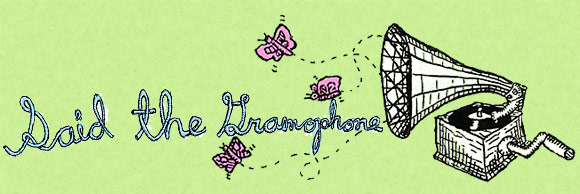Technically, so many songs are like so many others. The set of elements from which Western pop music is drawn is a relatively tiny one. The same pitches and timbres, melodies and harmonies, tempos and meters, appear again and again in both the songs we like and those we dislike. The questions Sean posed here about what sets good singer-songwriters apart from the rest, can be generalized to the problem of distinguishing between good music and the rest. So if, as Sean suggests, the subtle difference can be boiled down to something to do with “character and wit and voice and lightness of touch,” then what can the music critic do but point out that “here lies more character, wit, voice, and lightness of touch than does most elsewhere?” Essentially, we write about the same thing (I mean, almost the exact same thing) every day. How then can we find new ways of talking about it? Since the written word lacks the abstractly sublime quality of music, we are forced to do what music does not need to do: diversify. I hope that with some combination of the objective and the subjective, the analytic and the phenomenological, music writing can enrich the listener’s experience. Maybe through a diversity of approaches - essays, stories, codices, petit mal seizures, dances a propos de architecture, haiku, or epics - the critic can deepen the listener’s appreciation. Maybe sometimes with gratingly post-modern plays?
Elizabeth Cotten - Hello, young Bob. Why don’t you try to imitate my music.
Bob Dylan - Yes, OK, that sounds like a good idea. Here goes.
Well, that wasn’t so bad, eh?! Might actually be the start of something! But perhaps I shouldn’t have asked that young woman in the song to marry me. I mean, here I am, a year later, and I’ve left her. I’m all alone and on the dark side of the road.
James Carr - Here? With me, on the dark end of the street?
Bob Dylan - No, in a different but related place.
James Carr - Oh. Bob?
Bob Dylan -Yeah?
James Carr - How did you get from there to here?
Bob Dylan - James, it was such a long, long trip. I know it’s hard to see it this way, but maybe you should be thankful that the graph of your career has only one significant point.
James Carr - I’m not so sure about that, Bob.
Bob Dylan - No, nor am I, really. James?
James Carr - Yeah?
Bob Dylan - Goodnight.
James Carr - Goodnight, Bob. Goodnight, Elizabeth.
Elizabeth Cotten: Goodnight, guys.
fin
[Cotten and Dylan, Dylan, Carr]
Posted by Jordan at August 31, 2006 5:30 AMwonderful!
Posted by coral at August 31, 2006 11:12 AMhaha
what does this have to do with philip roth, or portnoy's complaint?
Posted by Anonymous at August 31, 2006 2:57 PMgracias, j.
Posted by smilesburger at September 1, 2006 2:39 AMThree of my favorites finally meet up! Nicely done! Also, your lines about the relationship between music and the written word reminds me of an essay by Mallarme about poetry and music. In this part he argues that good writing and poetry can better evoke an idea than any music can.:
"..Our present task, precisely, is to find a way of transposing the symphony to the Book: in short to regain our rightful due. For undeniably, the true source of Music must not be the elemental sound of brasses, strings, or woodwinds, but the intellectual and written word in all its glory. Music of perfect fulness and clarity, the totality of universal relationships."
Any thoughts?
Posted by Dylan at September 1, 2006 3:05 AMCoral - Thanks!
Anonymous - Not very much.
Smilesburger - Who are you?
Dylan - People are always telling me that I remind them of Mallarmé's aesthetics. Apparently the resemblance is uncanny. Though it's actually a finger puppet magnet in Schopenhauer's image that adorns my fridge. S. thought music was the superior art form, since its pure abstraction meant it was the only form to truly embody the will. I'm not sure there's any need to compare the forms. I prefer to think of each as its own language, with its own overlapping, but different expressive range. Literature can capture one aspect of a thought, and music another. Transposition from one to the other is not possible, and therein lies the problem for the music critic. Since we can't precisely express the idea we're writing about, what is it that we're doing? Are we just making recommendations? Simply providing diluted approximations of the object text's meaning? Hopefully we can do something interesting (or at least entertaining) by 1) Giving the reader enough information about the music so that she can begin to imagine it (whether that be through a description of the musical elements of the song, or of our reaction to it), and (more importantly in the case of mp3 blogs, where the reader needn't imagine the music) 2) Using the unique expressive capacity of the written word to approach the same ideas evoked by the music - not to express them in the same way or in the same aspect, but to round them out, illuminate them differently.
Of course, I only disagree with S. and M. (hmm) because they're not here to defend themselves. If those Two Bad Dudes had survived the 19th and persevered through the 20th, I'd be doing my best to defer to both without contradicting myself.
Posted by Jordan at September 2, 2006 4:40 AMI think I agree with you Jordan, over Schopenhauer or Mallarme. Music and writing do tend to cover different ground and trying to weigh one's expressiveness over the other can be a bit silly. However, it's hard for me to think about certain expressive limiations on the two. Why is it that in some cases, music succeeds where the written word fails and vice versa? Where, exactly, do these boundaries end, begin, or overlap? (I guess one example to answer my own question ((and subsequently contradict myself)) is that I've never been physically moved to dancing by reading a book or an essay.) I don't know, it's something I still need to think over.
Also, I think your points about music-writing as a blogger are right on. Indeed, many times in reading STG, the songs are brought to life in ways I might never have known had the written part not been included. I think this illuminating, as you put it, is what makes this site so rewarding to read.
Posted by Dylan at September 3, 2006 3:02 AMYeah, but Schopenhauer's music sucks.
Sometimes you can think too hard.
Posted by wcw at September 3, 2006 11:15 PMYou know, sometimes a 'f*** you haters' works equally well to silence your critics.
Posted by H at September 9, 2006 4:03 AM



